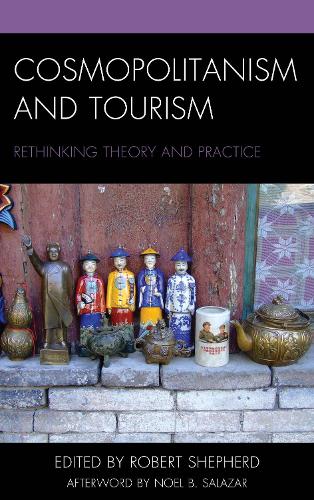
Cosmopolitanism and Tourism: Rethinking Theory and Practice
(Hardback)
Publishing Details
Cosmopolitanism and Tourism: Rethinking Theory and Practice
By (Author) Robert Shepherd
Contributions by Adam Kaul
Contributions by Ben Feinberg
Contributions by Sarah E. Edwards
Contributions by Rebecca L. Nelson
Contributions by David Geary
Contributions by Alex Jong-Seok Lee
Contributions by Cherubim Quizon
Contributions by Clare A. Sammells
Afterword by Noel B. Salazar
Bloomsbury Publishing PLC
Lexington Books
12th December 2017
United States
Classifications
Professional and Scholarly
Non Fiction
Social and cultural anthropology
Hospitality and service industries
306.4819
Physical Properties
Hardback
234
Width 160mm, Height 236mm, Spine 21mm
549g
Description
Within tourism studies, the cosmopolitan potentials of tourism have often been situated within a broader conversation about globalization, an approach that implies that cosmopolitanism is a predictable by-product of globalization and becoming more cosmopolitan should be the goal of travel. And yet a fundamental value of a cosmopolitan outlooknamely, to not only to be at home in the world but also to experience the world in an authentic sensedepends on the culturally embedded, parochial, and particular world views which it rejects. In Cosmopolitanism and Tourism: Rethinking Theory and Practice, contributors take this as a starting point. What does a worldly consciousness mean to people situated in different cultural landscapes and to what extent might these intersect with cosmopolitan values How is cosmopolitanism marketed in tourism and tourist-related industries such as service learning and study abroad And finally, what roles do social and economic class, educational background, gender, and other factors have in cosmopolitan claims The contributors to this edited collection address these questions in a series of case studies that range from Guatemala, Bolivia, and Ireland to China, India, and Dubai.
Reviews
This book is a much-needed intervention into academic debates about the production and consumption of travel, allure, place, otherness, and the multiple registers and resonances of tourist encounters as worldly experiences in the volatile and unsteady worlds of late-capitalist ruins. It is a notable and timely collection that makes an original contribution to the anthropology of tourism, travel, and cosmopolitanism. Using the very rich and distinctive perspectives, ethnographic locations, and subject matters of its authors the book troubles liberal assumptions about cosmopolitanism, as the world rapidly becomes a more complex and traveled place. This superb volume promises to become a key text in the field of tourism and travel studies. -- Kenneth Little, York University
If cosmopolitanism imagines a world where humanity might transcend the fictions of cultural categorieswhere people are no longer arbitrarily defined (and confined) according to nation, ethnicity, religion, class and genderthen how does tourism conform to this hope In this collection of compelling case studies among both international travelers and their hosts, constructions of difference stubbornly remain but the complexity of encounters across cultural frontiers also intensifies. A worthy addition to an anthropological exploration of a vital topic -- Nigel Rapport, St. Andrews Centre for Cosmopolitan Studies; author of Anyone, the Cosmopolitan Subject of Anthropology
With its rich ethnographic examples, this volume illuminates the often misunderstood intersection of tourism and cosmopolitanism. It makes a strong contribution to the theoretical discourse in both fields, while remaining accessible and engaging to those unfamiliar with either field. Its wide-ranging ethnographic work alone makes this a useful for volume for undergraduate classroom use, but taken together, they develop a sophisticated understanding of how individuals involved with tourism, both as consumer and producers, construct cosmopolitan identities. -- Simon Hawkins, University of Arkansas, Little Rock
Author Bio
Robert Shepherd is editor of the Critical Asian Studies journal, lecturer for the Smithsonian Journeys program, and adjunct professor of international affairs at George Washington University.
